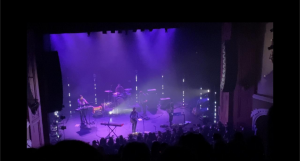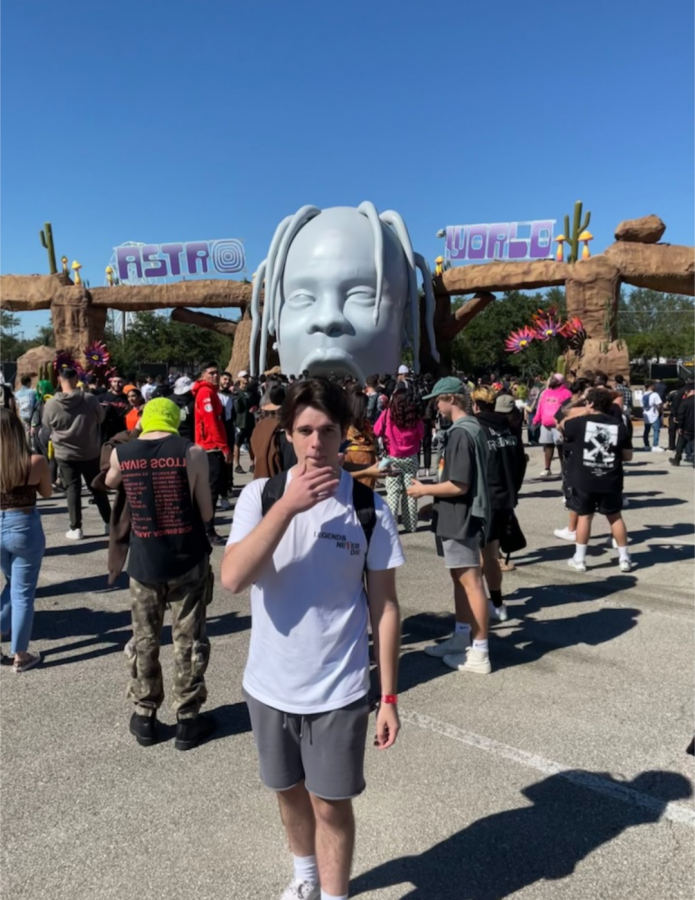CWU Students weigh in on concert crowd conduct following Astroworld tragedy
Robbie Blanch
November 18, 2021
Earlier this month, fans from across the country gathered to attend Travis Scott’s third iteration of the Astroworld Festival, a two-day event in which Scott and various other artists perform in the rapper’s hometown of Houston, Texas. What should’ve been the first night of music, entertainment and partying, turned into the only night of the festival, and resulted in one of the deadliest crowd-control disasters in U.S. history.
“You were crammed to the point where you just start stressing out,” Robbie Blanch, a sophomore who attended the Astroworld festival said. “I got claustrophobic many times early in the day. It didn’t feel good.”
Blanch said that this was his first concert, and he experienced dangerous crowd conduct far before Scott’s set. According to Blanch, a lack of accessible water, poor planning by event organizers and a crowd without concert experience were big reasons for the problems that occurred that night, not to mention Scott’s reputation for influencing his fans to “rage out.”
“Travis Scott’s built up this reputation where all of his fans are ‘ragers’ and they can do whatever they want,” Blanch said. “He set up this agenda where he wants you to sneak into his concerts, he wants you to pass out. People were just taking that to a whole new level that I don’t think he estimated could happen.”
Mehlika Eski, who’s worked helping to organize events and festivals for the Seattle alternative station 107.7 The End, said the audience at concerts reflect the energy of the artist performing.
 “You get a different vibe with each different crowd,” Eski said. “Different artists bring different energy and there’s a lot of different communities when it comes to music. With [different] communities they bring a different rulebook.”
“You get a different vibe with each different crowd,” Eski said. “Different artists bring different energy and there’s a lot of different communities when it comes to music. With [different] communities they bring a different rulebook.”
Some events she helped to organize included performances from artists like Billie Eilish to Slipknot. Eski said that performers and security hold a certain amount of responsibility for how the crowd behaves, and that if they notice something wrong, they should do something about it.
“I feel like it’s a shared responsibility, but also it’s shared among the crowd as well,” Eski said. “If you’re coming to a show you should understand you need to be respectful to people around you. If someone’s hurt you need to get help for them and things like that. I feel like there’s definitely a heavy weight on the artist themselves because it’s their event, but at the same time, you can’t put all the weight on them.”
Eski said that fans sometimes put artists on a pedestal, which can lead to individuals in crowds pushing and shoving their way to the front in order to be as close to them as possible, potentially ignoring the safety of others in order to achieve their goal. This can create dangerous scenarios at shows by artists who may not even perform music that would be considered “moshable.”
Amanda Tebo, a senior computer science major, recalled her experience at a Twenty One Pilots concert, which she said was the only time she ever felt unsafe at a venue.
“Before the show even started the crowd was pushing so hard towards the stage … that I was physically constricted there,” Tebo said. “I’ve been to metal-core shows where literal mosh pits are happening and people are super respectful. I think it’s based on the fanbase the band itself attracts.”
Tebo attributed the danger caused by the crowd at the Twenty-one Pilots show to “fangirling” and the negative effects of influencer culture.
“We see people on social media that are living the life and doing all these cool things,” Tebo said. “We want to be part of that. We have the desire to feel like we’re a part of that person’s life even though we don’t really know anything besides the things they’re choosing to show us. I think there’s a lot of disorientation for some people that think, ‘Oh, I see this person’s life, so I’m a good friend of theirs.’ But in reality you’re just a stranger to that person.”
As of now, ten people have died from the Astroworld festival and hundreds of individuals sustained injuries. It’s unclear who will be held ultimately responsible for the tragedy, but investigations are continuing.
Blanch said he’s hesitant to attend another concert, but ultimately doesn’t regret going.
“I definitely had fun, but it’s definitely a tainted memory due to the stories that came out of it,” Blanch said. “It’s a good experience for future reference to have.”



